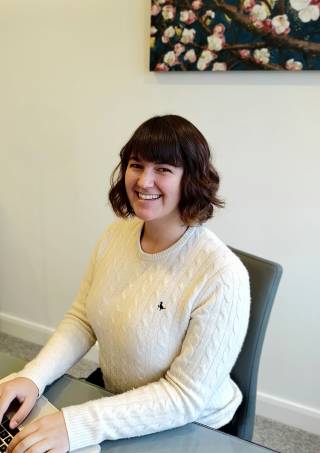Elizabeth is a PhD Candidate in Clinical Medicine Research at Imperial College London, who studied the MSc Clinical Neuroscience programme at Queen Square in 2018-19.

1. What attracted you to the study of Neuroscience?
I was attracted to neuroscience because of my sense of curiosity and desire for answers. To me, the world has always been a complex and exciting place full of mysteries waiting to be uncovered. That’s why I decided on a career in science in the first place. To be able to spend my days being the one to uncover what is yet unknown is thrilling. As for neuroscience, my decision to dive into this amazing field of research was made when I learned enough about biology to realize that every question I had about who we are and how we work as human beings can be linked back to the brain. It is the organ that allows us to think, perceive, feel, communicate, move, learn, and remember. The brain is who we are and how we live. Studying that seemed like the most exciting avenue for a research career. Plus, I have always wanted my work to help those most in need. Being a neuroscientist often means studying incredibly common diseases that have terrible effects, but for which we still do not have all the answers. This added in a layer of motivation and purpose to my desire for knowledge and my curious nature. For me, neuroscience has always been a perfect fit.
2. Who are the people who has inspired you most throughout your career?
I have been inspired by famous researchers past and present, by teachers, by supervisors, and by colleagues. However, my biggest inspirations have always been my loved ones. Namely my parents, my sister, and my partner. Not only are all of these people in my life extraordinary in their levels of intelligence and kindness, but they are all passionate about what they do and eager to find work that excites them. They are my support network and my greatest examples of strength, patience, and love. I have learned through them that inspiration does not need to come from those who do the same thing as you, or those who have followed a similar career path. Instead, inspiration should be taken from those who live happily and fully. From those who have found balance in their lives, and from those who are still excited about their careers despite stress, repetition, or simply the passage of time.
3. Is there any lecturer/researcher that stood out during your time at Queen Square?
Absolutely! There are so many researchers and lecturers that made my time at Queen Square incredibly fulfilling. My favourite lecture during my time at Queen Square was given by Professor John Hardy. He is an incredible scientist and I know that all of us students, myself included, were amazed to be taught by such a neuroscience legend. However, what really stood out about his lecture was not his reputation, but his passion for his work and his skill at teaching. I have had many lectures in my time from academics who struggle with public speaking or who have difficulty explaining their work succinctly and understandably. But Professor Hardy was not one of those people. He was excited to share with us, spoke clearly and easily, and gave a profoundly thought-provoking lecture. It was wonderful!
As far the researchers who stood out, I would of course have to say the amazing members of my research project lab. Specifically, my supervisor, Dr. Gabriele Lignani, and the post-doc who guided me through my project, Dr. Eleonora Lugarà. These researchers made me feel welcome, taught me many skills that have since proved vastly useful in my career, and were incredibly supportive. Their hard work and dedication to my success and the success of the entire team meant that I was able to get the most out of my research project and graduate with Distinction. I will be forever grateful for their teaching and support.
4. Since leaving Queen Square what have you been working on (area of research)?
Since leaving Queen Square, I was accepted into a PhD programme in Clinical Medicine and Clinical Research at Imperial College London in Dr. Vincenzo De Paola’s Neuroplasticity and Disease Group. My work utilizes 2-photon microscopy and an in vivo model of disease to study Down’s Syndrome neuronal development, synaptic structural stability, and calcium activity. I was able to secure funding as a part of the Syn2Psy programme, which is an innovative training network funded by Horizon2020 and Marie Sklowdowka-Curie Actions. The programme unites researchers from multiple European universities with the goal of increasing neuroscientific research of neuropsychiatric disorders at the molecular, cellular, and model organism levels. I am incredibly fortunate to be a part of this network and to be supervised by Dr. Vincenzo De Paola. My PI and group members have all been incredibly supportive of my learning and research endeavours and continue to do so.
5. What are your fondest memories of your time at Queen Square?
My fondest memories are of spending time with my fellow students. We would often go for walks together to Chinatown for dinner after lectures and spend our lunches chatting over coffees at St. Georges café. Through the programme, I met some wonderful people who made settling into London life a breeze. My time at Queen Square would not have been the same without those lovely people!
 Close
Close

